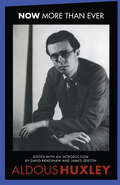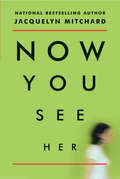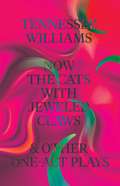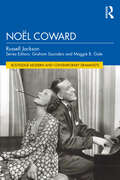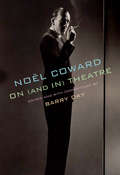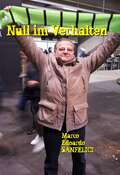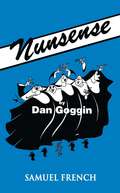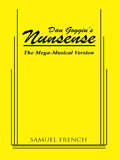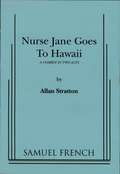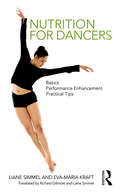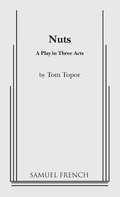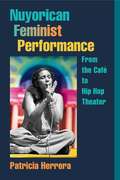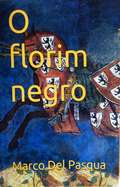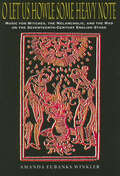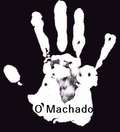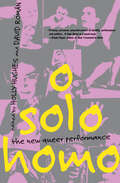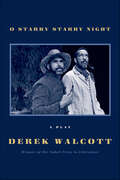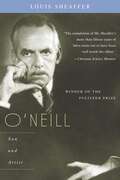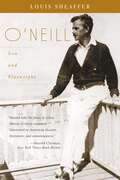- Table View
- List View
Now More Than Ever: An Edition
by Aldous HuxleyOver the course of his career, British writer Aldous Huxley (1894-1963) shifted away from elitist social satires and an atheistic outlook toward greater concern for the masses and the use of religious terms and imagery. This change in Huxley's thinking underlies the previously unpublished play Now More Than Ever. Written in 1932-1933 just after Brave New World, Now More Than Ever is a response to the social, economic, and political upheavals of its time. Huxley's protagonist is an idealistic financier whose grandiose schemes for controlling the means of production drive him to swindling and finally to suicide. His fate allows Huxley to expose the evils he perceives in free-market capitalism while pleading the case for national economic planning and the rationalization of Britain's industrial base. This volume contains the full text of Now More Than Ever, which was believed to be lost until 1976, when a copy was found at the Harry Ransom Humanities Research Center of the University of Texas at Austin. A "thinker's play" that has never been produced on stage, it is the last previously unpublished piece of Huxley's major writings and immensely important to understanding his development as a writer. The editors of this volume have annotated the play for contemporary readers. Their introduction sets the play in the context of Huxley's intellectual life.
Now You See Her
by Jacquelyn MitchardFor Hope Shay the entire world is a stage. Really. Acting has been her dream for as long as she can remember. She will do anything, anything, to get a leading role. Okay, maybe faking her own abduction was extreme. But a true actress suffers for her art. And Hope is a born actress if ever there was one.
Now You See Her
by Jacquelyn MitchardFor Hope Shay the entire world is a stage. Really.Acting has been her dream for as long as she can remember. She will do anything, anything, to get a leading role. Okay, maybe faking her own abduction was extreme. But a true actress suffers for her art. And Hope is a born actress if ever there was one.
Now the Cats With Jeweled Claws & Other One-Act Plays
by Tennessee Williams Thomas Keith"The peak of my virtuosity was in the one-act plays--like firecrackers in a rope." --Tennessee Williams This new collection of fantastic, lesser-known one-acts contains some of Williams's most potent, comical and disturbing short plays?Upper East Side ladies dine out during the apocalypse in Now the Cats With Jeweled Claws, while the poet Hart Crane is confronted by his mother at the bottom of the ocean in Steps Must Be Gentle. Five previously unpublished plays include A Recluse and His Guest, and The Strange Play, in which we witness a woman's entire life lived within a twenty-four-hour span. This volume is edited, with an introduction and notes, by the editor, acting teacher, and theater scholar Thomas Keith.
Noël Coward (Routledge Modern and Contemporary Dramatists)
by Russell JacksonNoël Coward combines a fresh appraisal of major plays by one of the twentieth century’s most popular dramatists, with an account of critical and theatrical responses to his life and work.For almost the entirety of the twentieth century, Noël Coward was one of the UK’s most popular and celebrated playwrights. Refracting, rather than directly reflecting the social and personal issues of his time, his plays reveal tensions and contradictions in the theatre world that surrounded them. As well as critical responses to his work and the key themes that it foregrounds, seminal productions of The Vortex, Private Lives, Design for Living, Hay Fever, Blithe Spirit and more are examined to further elaborate on the radicalism of his approach to personal and social relationships, and the ways in which directors and actors have sought to achieve a sense of the disquiet felt by critics and audiences when they were first produced. This book explores the question of what Coward’s work can speak to for today’s modern audiences, assessing his standing in terms of how conditions have changed in the theatre and society more broadly since they were written.Part of the Routledge Modern and Contemporary Dramatists series, Noël Coward provides undergraduate students on Theatre Studies degrees and Modern Drama courses an essential and accessible guide to the playwright’s work and illustrates the influence of his drama on what theatre can tell us about our society.
Noël Coward on (and in) Theatre
by Noël CowardNoël Coward on theatre was as dazzling and entertaining as his masterful plays and lyrics. Here his ideas and opinions on the subject are brilliantly brought together in an extraordinary collection of commentary, lyrics, essays, and asides on everything having to do with the theatre and Coward's dazzling life in it.The book Noël Coward wanted, promised, threatened to write—and never did. Including essays, interviews, diary entries, verse, his views on his fellow playwrights: "My Colleague Will," Shaw, Wilde, Chekhov, Barrie, Maugham, Eliot, Osborne, Albee, Beckett, Miller, Williams, Rattigan, Pinter, and Shaffer. Coward on the critics—many of whom irritated him over the years but came to admire him: James Agate, Alexander Woollcott, Graham Greene, Kenneth Tynan among them. And on the plays he wrote, among them: The Vortex; Hay Fever; Private Lives; Design For Living; Blithe Spirit.Here is the Master on the producers who crossed his path: André Charlot, C. B. Cochran, Binkie Beaumont. And the actors in the Coward galaxy: John Gielgud, Laurence Olivier, Gertrude Lawrence, the Lunts, etc. . . . His views on the art of acting: auditions, rehearsals, learning the lines, clarity of delivery, timing, control, range, stage fright, fans, theater audiences, revivals, comedy, "the Method," plays with a "message," taste, construction, "Star Quality," etc. . . . And last, but Noël Coward least, his experience in, and thoughts on: revue, cabaret, television, and musical theater, Bitter Sweet, Conversation Piece, Pacific 1860, After the Ball, Ace of Clubs, Sail Away, The Girl Who Came to Supper, Words and Music, This Year of Grace, London Calling! . . . and much more. Ingeniously, deftly compiled, edited, and annotated by Barry Day, Coward authority and editor of The Noёl Coward Reader and The Letters of Noёl Coward.
Null im Verhalten: Die Zeugnisse von drei Jahren Juventus-Spiele.
by Marco Edoardo SanfeliciDie Zeugnisse von drei Jahren Juventus-Spiele. Null im Verhalten Das Buch sammelt die besten Zeugnisse von Marco Edoardo Sanfelici. Die Urteile, die nach jedem Juventus-Spiel Fotos von der Leistung des Juventus-Teams machen, sind Urteile ohne Berufung. Aus dem brillanten und leidenschaftlichen Geist eines Fan-Kommentators sind hier die urkomischen Bewertungen, die das Verhalten Ihrer größten Idole auf dem Platz besser als jedes VAR-Bild bezeugen.
Nunsense
by Dan GogginMusical / 5f / Unit set Winner of four Outer Critics Circle Awards including Best Off Broadway Musical in its original New York production, this hilarious international hit was revived in New York with a male cast Nunsense A Men!. The show is a fund raiser put on by the Little Sisters of Hoboken to raise money to bury sisters accidently poisoned by the convent cook, Sister Julia (Child of God). Up dated with new jokes, additional lyrics, two new arrangements and a brand new song, this zany musical has been videotaped for television starring Rue McClanahan as the Mother Superior. "A hail of fun and frolic! Wacky and outrageous with a hysterical anything goes sense of fun!" N.Y. Times. "You don't have to be Catholic to love Nunsense!" Entertainment Tonight. "Inspired madness! Go see it!" Jewish Post and Opinion. "Guaranteed to lift your spirits...Very, very funny." National Catholic News.
Nunsense: The Mega-Musical Version
by Dan GogginMusical . Characters: 1 male, 9 female, chorus, and extras . Unit Set . "Nunsense: The Mega-Musical Version" is here! All the fun of the original "Nunsense" has been super-sized! If you're looking for a Large Cast Musical Comedy this award-winning show is the perfect choice. "Mega-Nunsense" starring the original five nuns features five new (male and female)characters including the never- before-seen infamous convent cook, Sister Julia, Child of God. In addition there is a large chorus of men, women and children. A new song ("One Last Hope") and two expanded dance numbers have been added as well as an optional guest spot for a local celebrity. "Nunsense", the winner of four Outer Critics Circle Awards including Best Musical was called "A hail of fun and frolic" by the New York Times. And now it's bigger and better than ever! It would be a sin to pass up the opportunity to present it!
Nurse Jane Goes to Hawaii
by Allan StrattonFarce comedy / 3m, 4f / One set / When Vivien Bliss, writer of Harlequin Romance novels, comes to spend a romantic weekend with respectably married school teacher Edgar Chisholm, she starts a train of events which involves all the classic elements of farce confused identities, disguise, long lost relatives, ambushes, chases and glorious mayhem. How Vivien gets her new novel finished in the face of, behind the back of, in spite of and with the help of an advice columnist, a nosy reporter, a doctor in panty hose, an orphan with a cake and Helga the evil Russian physicist, is the story of this hilarious play.
Nutrition for Dancers: Basics, Performance Enhancement, Practical Tips
by Liane Simmel Eva-Maria KraftDancers are top performance athletes on stage – to keep fit andhealthy proper nutrition is an integral part of an optimal dancetraining. Nutrition for Dancers provides the principles of nutritionfor dancers of all genres. Authors Liane Simmel and Eva-Maria Kraft clarify widespread nutritional mistakes and giveadvice on how a healthy diet can be incorporated into the everydaylife of dancers.
Nuts
by Tom ToporTom ToporFull Length, DramaCharacters: 6 male, 3 female. Interior Set. A Broadway hit, Nuts has been called the best courtroom melodrama since Witness for the Prosecution and The Caine Mutiny Court Martial. Set in a courtroom in New York's Bellevue Hospital, the story follows a high-priced call girl incarcerated on a charge for killing a violent "john". The State, represented by a court appointed psychiatrist and an aggressive prosecutor, say Claudia Faith Draper is unfit to stand trial. As testimony from experts, physicians and her parents unfolds, with her psyche and childhood dissected, she proves to the judge that she isn't "nuts" and stands legally sane at trial for manslaughter. . "[Has] the audience rooting for the good guys and hating the bad guys, as if the whole event was the most beautifully professional wrestling match you have ever seen. Nuts is a play that moves you ... you are in court watching a woman fight for what she believes is her total future."-New York Post
Nuyorican Feminist Performance: From the Café to Hip Hop Theater
by Patricia HerreraThe Nuyorican Poets Café has for the past forty years provided a space for multicultural artistic expression and a platform for the articulation of Puerto Rican and black cultural politics. The Café’s performances—poetry, music, hip hop, comedy, and drama—have been studied in detail, but until now, little attention has been paid to the voices of its women artists. Through archival research and interview, Nuyorican Feminist Performance examines the contributions of 1970s and ’80s performeras and how they challenged the Café’s gender politics. It also looks at recent artists who have built on that foundation with hip hop performances that speak to contemporary audiences. The book spotlights the work of foundational artists such as Sandra María Esteves, Martita Morales, Luz Rodríguez, and Amina Muñoz, before turning to contemporary artists La Bruja, Mariposa, Aya de León, and Nilaja Sun, who infuse their poetry and solo pieces with both Nuyorican and hip hop aesthetics.
O Câncer do Amor
by Thayller Weverton Barp Mohmmed AlsofiSim!! O Amor é como um câncer, porque ele o prende a alguém e a imagem dele/dela fica presa em sua mente, além disso, essa pessoa se torna seu coração, quando ele/ela se sente feliz você se sente feliz e quando ele/ela se sente triste você se sente triste, nada mais importa, a não ser dar a ele/ela qualquer coisa que ele/ela precise, mesmo se essa coisa custe sua própria felicidade, sim, isso é o amor!!
O Florim Negro
by Sandra Santos Marco Del PasquaUmberto é um médico milanês, agora, prestes a se aposentar. Por pura curiosidade, investiga sobre a origem do seu sobrenome e descobre uma distante origem nobre toscana. O seu ancestral gibelino se refugiou em 1285 em um castelo em Siena com o bispo de Arezzo. Guglielmo, da família nobre Ubertini, instigou uma rebelião contra a cidade de Siena, que terminara meses depois, com um banho de sangue.O protagonista, fascinado pelas belezas do lugar, decide comprar uma casa nas vizinhanças do castelo, abandonado e inacessível por anos. Deixa Milão para se mudar e passar a velhice. Durante os trabalhos de restauração encontra, ao acaso, uma moeda antiga fiorentina, um florim de cobre, também chamado de florim negro, e Cesira, uma clarividente, percebeu que a moeda pertencia a um personagem muito importante: Dante Alighieri, e fora perdida em circunstâncias tumultuadas e dramáticas.O romance narra a história de Riccardo, um soldado de infantaria fiorentino, que ficara ao lado do jovem cavaleiro Dante Alighieri durante o terrível cerco ao castelo. A história do jovem Riccardo, no século XIII, se cruza com a de Umberto até os dias de hoje, para ambos, os eventos que acontecem naquele castelo mudarão a vida para sempre.Umberto, como Riccardo séculos antes, descobrirá o amor naquele mesmo lugar.Dois protagonistas de épocas diferentes, um paralelo entre eles, que desafiam o desconhecido, descobrindo novas e inesperadas paixões. Uma história aventurosa de homens, armas e amor, que se entrelaça entre a Idade Média e os dias atuais.
O Let Us Howle Some Heavy Note: Music for Witches, the Melancholic, and the Mad on the Seventeenth-Century English Stage
by Amanda Eubanks WinklerIn the 17th century, harmonious sounds were thought to represent the well-ordered body of the obedient subject, and, by extension, the well-ordered state; conversely, discordant, unpleasant music represented both those who caused disorder (murderers, drunkards, witches, traitors) and those who suffered from bodily disorders (melancholics, madmen, and madwomen). While these theoretical correspondences seem straightforward, in theatrical practice the musical portrayals of disorderly characters were multivalent and often ambiguous.O Let Us Howle Some Heavy Note focuses on the various ways that theatrical music represented disorderly subjects--those who presented either a direct or metaphorical threat to the health of the English kingdom in 17th-century England. Using theater music to examine narratives of social history, Winkler demonstrates how music reinscribed and often resisted conservative, political, religious, gender, and social ideologies.
O Machado
by Antonio Morcillo Lopez Angela R. BarbosaDois mecânicos peculiares numa qualquer garagem de uma qualquer cidade de Espanha, descobrem, no carro que consertam, algo que modificará as suas monótonas vidas e que lhes fará revelar o seu lado escuro. A violência é cada vez mais presente no nosso dia-a-dia, no nosso local de trabalho, nas nossas relações sociais e especialmente nos media. Pouco a pouco, eventos sérios, como um ataque terrorista, fazem parte do pão de cada dia, tornando-nos cada vez mais insensíveis. Esta obra pretende ser um espelho no qual o espectador se observa e reconhece o lado escuros que nenhum de nós está disposto a ver: De verdade que não seria capaz de matar alguém? Somos todos tão cívicos ao ponto de não cruzar a linha que nos torna também terroristas? Que culpa tem a media em tudo isto? Em que medida somos capazes de exercer esta violência en nós próprios? Publicado por Ñaque, 1998. Estreia no Auditório de Albacete, Espanha. Novembro 1996.
O Solo Homo: The New Queer Performance
by Holly Hughes David Román“Fresh, funny, sad, and sexy . . . [A] diverse collection of good, honest, and soundly structured monologue writing” (David Drake, Obie Award–winning actor and playwright). O Solo Homo is a diverse, definitive, and hugely entertaining collection representing the cutting edge of queer solo performance. The pieces in O Solo Homo touch nerves that run deep—from sex, politics, community, and health to the struggles and joys of family, friends, and lovers. Peggy Shaw, of Split Britches, revisits how she learned to be butch. The late Ron Vawter, of the Wooster Group, juxtaposes the lives of two very different men who died of AIDS: diva filmmaker Jack Smith and Nixon crony Roy Cohn. Tim Miller, one of the NEA 4, surveys the landscape of gay desire before and after the advent of AIDS. And Carmelita Tropicana, the “national songbird of Cuba,” makes an unforgettable, hilarious return to Havana. “A funny, personal, powerful primer of identity, performance and politics. O Solo Homo is a must read.” —Paula Vogel, Pulitzer Prize–winning author of How I Learned to Drive “Naked passion, fiery intellect and dissatisfaction with the status quo mark all good performance art. This collection embodies those elements at their best. Each piece makes you sit up and listen.” —Jewelle Gomez, author of The Gilda Stories “O Solo Homo represents the most significant and vibrant cross-section of queer solo performance since the gospels. A must-have field guide for the amateur and professional alike. Ten thumbs up!” —The Five Lesbian Brothers
O Starry Starry Night: A Play
by Derek WalcottTwo masterful artists—Gauguin and van Gogh—come alive in a vibrant drama about friendship, art, and madness Two painters—Paul Gauguin and Vincent van Gogh—are living together in the sleepy town of Arles in 1888. Soon, Gauguin, frustrated by van Gogh's refusal to acknowledge his increasingly troubled mind, will depart for Paris. In two years, van Gogh will be dead by his own hand. In the meantime, the friends discuss their craft; they frequent a local café that van Gogh will soon immortalize; they become acquainted with a young prostitute, Lotte, who becomes Gauguin's lover; they argue; they paint. In Derek Walcott's new historical play, O Starry Starry Night, two world-renowned artists come to life as they wrestle both with grand themes—friendship, loyalty, fame—and with more mundane concerns, money primary among them. The scenes Walcott sketches summon several of van Gogh's most famous paintings: Sunflowers, The Night Café, The Bedroom at Arles. His manipulation of language—van Gogh's eloquent monologues giving way to more abstract speeches—evokes the painter's descent into madness. Over the action hangs the threat of violence, of death, which lends the play a potent urgency; for at least one of the characters, time is quickly running out.O Starry Starry Night is powerfully wrought, and demonstrates once again the sharpness of Walcott's eye: as a painter, as a poet, as a writer, and, above all, as an observer of human follies, foibles, failings, and aspirations.
O iphihletšeng?: UEB Contracted
by Lesiba MaphosoO iphihletšeng? Mma o hlokofetše ge ke fetša marematlou, tate a gana go nkiša sekolong, fela ka fetša ke ile ntle le yena ... tate o rekišitše dikgomo mola ka gae a re bolaiša dikgakgaripane, megwapa ya dikgomo tšago ota ya go bola le moratha, fela re a fepega ... kgaetšedi le mogadibo ga ba šome, fela tate o rekelwa sellathekeng ... kgaetšedi o utswa dikgomo mola dikgomo tša tate di fela, fela lehodu la tšona ga se yena ... Yo mongwe o dira mošomo wo mobotse ka gare ga nyaganyaga ye, ka fao o swanelwa ke go lebogwa, fela motho yoo ga a itšweletše ... O iphihletšeng? “Motswako wa maikemišetšo le leratorato ka gare ga bongame le tshegišo, di ngwadilwe ka maatlakgogedi a go dira gore o phetle letlakala ka letlakala go fihla ka la mafelelo.” Vicky Seja Moletja - Mogaši wa dipapadi wa Thobela FM, o realo ka diteng tša tiragatšo ya Lesiba Maphoso.
O iphihletšeng?: UEB Uncontracted
by Lesiba MaphosoO iphihletšeng? Mma o hlokofetše ge ke fetša marematlou, tate a gana go nkiša sekolong, fela ka fetša ke ile ntle le yena ... tate o rekišitše dikgomo mola ka gae a re bolaiša dikgakgaripane, megwapa ya dikgomo tšago ota ya go bola le moratha, fela re a fepega ... kgaetšedi le mogadibo ga ba šome, fela tate o rekelwa sellathekeng ... kgaetšedi o utswa dikgomo mola dikgomo tša tate di fela, fela lehodu la tšona ga se yena ... Yo mongwe o dira mošomo wo mobotse ka gare ga nyaganyaga ye, ka fao o swanelwa ke go lebogwa, fela motho yoo ga a itšweletše ... O iphihletšeng? “Motswako wa maikemišetšo le leratorato ka gare ga bongame le tshegišo, di ngwadilwe ka maatlakgogedi a go dira gore o phetle letlakala ka letlakala go fihla ka la mafelelo.” Vicky Seja Moletja - Mogaši wa dipapadi wa Thobela FM, o realo ka diteng tša tiragatšo ya Lesiba Maphoso.
O'Neill: Son and Artist
by Louis ScheafferThe most lauded playwright in American history, Eugene O'Neill (1888-1953) won four Pulitzer Prizes and a Nobel Prize for a body of work that includes The Iceman Cometh, Mourning Becomes Electra, Desire Under the Elms, and Long Day's Journey into Night. His life, the direct source for so much of his art, was one of personal tumult from the very beginning. The son of a famous actor and a quiet, morphine-addicted mother, O'Neill had experienced alcoholism, a collapse of his health, and bouts of mania while still a young man. Based on years of extensive research and access to previously untapped sources, Sheaffer's authoritative biography examines how the pain of O'Neill's childhood fed his desire to write dramas and affected his artistically successful and emotionally disastrous life.
O'Neill: Son and Artist, Volume 2
by Louis SheafferThe second volume in the biography of the playwright Eugene O'Neill, O'Neill, Son and Artist brings Louis Sheaffer's monumental biography of America's foremost playwright to a poignant, dramatic conclusion. Together with the previous volume, O'Neill, Son and Playwright, Sheaffer's biography now stands complete as the most authoritative study ever written about the life of Eugene O'Neill. Based on many sources hitherto unknown or inaccessible, in addition to all the established standard sources, this volume catches the turmoil of O'Neill's private life and illuminates how it shaped and haunted his artistic achievements. Sheaffer introduces fresh material uncovered during seven years of research that recounts O'Neill's personal life in intimate, harrowing detail: the deaths of his family, one by one in rapid succession; the bouts with liquor that nearly killed him; his manic temperament and insatiable restlessness; his acute discomfort in the role of father and the disastrous affect it had on his children; his Strindbergian marriage to Carlotta Monterey, characterized by total dependence and often enough deep hatred on both sides; his later illness, which left him unable to write or dictate, but with a mind at the height of its artistic and intellectual powers. From O'Neill's first Broadway success in 1920, Beyond the Horizon, Sheaffer examines the effect of these crises on his career, most notably on the creation of The Iceman Cometh and Long Day's Journey Into Night. And he refocuses on O'Neill's past, particularly his relations with his family--"the fountainhead of his passion and power"--as this most private dramatist reveals himself more and more nakedly in his plays, finally baring all in his tragic masterpiece of the "four haunted Tyrones," Long Day's Journey Into Night. Vigorously written, scrupulously researched, compassionate in its treatment of the tormented man who "transmuted private history and secret anguish into art," O'Neill, Son and Artist takes its place beside its prizewinning companion volume as a landmark American biography.
O'Neill: Son and Playwright
by Louis ScheafferThe most lauded playwright in American history, Eugene O'Neill (1888-1953) won four Pulitzer Prizes and a Nobel Prize for a body of work that includes The Iceman Cometh, Mourning Becomes Electra, Desire Under the Elms, and Long Day's Journey into Night. His life, the direct source for so much of his art, was one of personal tumult from the very beginning. The son of a famous actor and a quiet, morphine-addicted mother, O'Neill had experienced alcoholism, a collapse of his health, and bouts of mania while still a young man. Based on years of extensive research and access to previously untapped sources, Sheaffer's authoritative biography examines how the pain of O'Neill's childhood fed his desire to write dramas and affected his artistically successful and emotionally disastrous life.
O'Neill: Son and Playwright, Volume 1
by Louis SheafferWinner of the Theater Library Association's George Freedley Memorial Award as the Best Theater Book of 1968. This is the first volume of Pulitzer Prize-winning Louis Sheaffer's monumental biography of America's greatest playwright. Here is groundbreaking information on every aspect of O'Neill's life up to 1920, when he was launched on Broadway with the opening of "Beyond the Horizon." Louis Sheaffer spent sixteen years researching and writing his well-honored biography. For his work on O'Neill Mr. Sheaffer was awarded three Guggenheim fellowships, two grants-in-aid by the American Council of Learned Societies, and a grant by the National Endowment for the Humanities.
